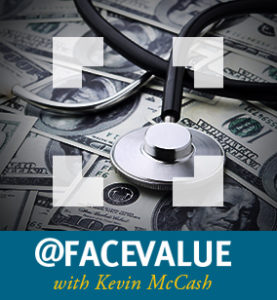Love and Presidents
 February is a month to celebrate two things, love and the birthdays of former presidents. It also happens to be the birthday month for my father but you probably don’t care about that. I amreferring of course to our most recent holidays, Valentine’s Day and President’s Day. For a lot of people that only means overpriced greeting cards and looking forward to week long furniture store sales. (As an aside does anyone really buy furniture at full price? Seems like any Tuesday is reason for those guys to have a sale but, I digress.) These two holidays are actually much more than that. Valentine’s Day is meant to be a celebration to mark all of the relationships that make our lives richer. President’s Day is a little more contrived but besides being a so-so reason for getting a day off it is a celebration of two men that made a significant impact on the history of the United States, her government and her people. So, this edition of @ Face Value is brought to you by love and presidents.
February is a month to celebrate two things, love and the birthdays of former presidents. It also happens to be the birthday month for my father but you probably don’t care about that. I amreferring of course to our most recent holidays, Valentine’s Day and President’s Day. For a lot of people that only means overpriced greeting cards and looking forward to week long furniture store sales. (As an aside does anyone really buy furniture at full price? Seems like any Tuesday is reason for those guys to have a sale but, I digress.) These two holidays are actually much more than that. Valentine’s Day is meant to be a celebration to mark all of the relationships that make our lives richer. President’s Day is a little more contrived but besides being a so-so reason for getting a day off it is a celebration of two men that made a significant impact on the history of the United States, her government and her people. So, this edition of @ Face Value is brought to you by love and presidents.
What do love and presidents have to do with each other? Nothing. At least not on the surface. Their underlying concepts however, are rooted in the same place. One is a cultural and physiological condition of social interaction. The other a pretty universal symbol for government. So what do social interaction and government have to do with each other? Nothing. I’m kidding of course. They are both a part of everyone’s favorite “s” word. No not that one. Society and specifically the social contract.
Some of you may be asking “What’s a social contract?” others are just curious how I got this whole blogging gig. The social contract is a philosophical concept that originated in the Age of Enlightenment (a period of really deep thought during the 17th and 18th centuries) as a route to explaining the most effective way for a society of individuals to work together toward a “better life.” Many of the famous names such as Hobbes, Locke and Rousseau used the concept of the social contract to theorize about how government and social structure should be set up in order to maximize the benefit for all involved. In the shortest terms possible it is the concept that every individual in a society must do certain things and give up some freedoms, like the ability to murder and steal, in order for a civilization to actually be civilized. These thoughts were incorporated into the political discourse of the early United States government; namely the Declaration of Independence and the United States Constitution.
Starting to see my connections here? So what about the lovey-dovey stuff? Well that comes from a social contract also. Not a contract rooted in civics but one that we accept as part of our normal lives in the form of societal guidelines for how to interact. For example if someone walked up to you and slapped you in the face to introduce themselves instead of shaking your hand you probably wouldn’t be very interested in speaking with them.

The handshake is a very simple example of how we as a society have set social ground rules. Now I would never presume to say that there is a strict “set of requirements” for social interactions but I won’t be slapping anyone in the face anytime soon. There are definitely behavioral expectations for speaking with others, romance and group interactions such as concerts and parties. Personal experience tells me that there are definitely specific and separate rules when it comes to saying hello, dating and mosh pits (I’m not terribly certain those last two would mix well at all). As for parties… well I went to school for physics. Physicist parties, if you are curious, are really not that great. As an undergrad I went to a party with my physics department friends to do what college kids do and, no kidding, practice quantum mechanics.
Now this blog is not about history, philosophy or a platform for my own inane ramblings about my ridiculous college experiences. It is about value-based healthcare. The value-based model of healthcare is, as I have said many times, a fundamental shift from previous ways of doing things. It is at its very essence a cultural change. It will require reevaluation of the fundamental methods of medicine, of the economics of health, of the legal structure for health care and the handling of healthcare information. In addition (and most importantly) a value-based system requires the acceptance and participation of, you guessed it, society as a whole. The purpose of the discussion above was not intended to just show off my knowledge of the social contract but to illustrate a point about how we make changes to our ways of thinking and how we have unwritten rules that guide our actions as functioning members of society.
A wholesale (furniture on the brain again) acceptance of the value-based healthcare (VBH) concept doesn’t just mean that people have to be ok with spending less on health insurance. If that was the case then there would be riots asking why this has happened yet. What I mean is that people have to be active participants in their own healthcare and encouraged to do so by a society that supports that change. People must go to see their primary care physicians for check-ups every year and actually follow the suggestions that are given not because it’s a good idea but because they feel it is a normal and encouraged behavior. In essence the personal choices of individuals need to align in such a way that all parts of our society can benefit from the change. Personal health has become much more important to many people lately with the advent of personal health trackers you wear on your wrist and smart phone apps that allow you to track what you eat and drink to manage calorie and nutrient intake. However, these are just small pieces of a very large pie.
Value-based payment models function from the patient up as active participants. Volume based concepts were designed for providers to be fairly compensated for work they complete with the assumption that said work was in the best interest of the patient. In the VBH world the participation of patients is a necessary step for the savings to truly kick in. A society that does not practice good preventative care will be more inclined to have chronic diseases and more complex episodes of care than one that is collaborating with healthcare providers to make active changes. Basically the sum of individual efforts will help to ease the process of change and work to the benefit of everyone.
If you think this is too big a pill to swallow then let me tell you a story. There once was a virus called smallpox and it was a nasty bugger. Smallpox was very unscrupulous as viruses go and killed a lot of people all throughout human history. Then in the late 1700’s Edward Jenner introduced the inoculation referred to as the vaccine. Fast forward 230 years and vaccines are all around us. They are required for entry into the school system and generally as part of our society (a clause in our social contract if you will). Smallpox was eradicated about 40 years go because the world bought into the idea that getting stabbed a few times was better than large numbers of people continuing to die. The same sort of buy in is required to help realize VBH. Is visiting your doctor, eating less pizza and getting on a treadmill every now and then the same as getting the smallpox vaccine? No because being stabbed a few times is much easier and less time consuming. However, smallpox was a big deal for a REALLY long time. Right now our economic expenditure on healthcare is a REALLY big deal and has no end in sight. Only by urging our social contract toward requiring an active role in your own health will a true value-based system emerge. It would be the same as getting a vaccine for high healthcare costs not just for your benefit but for the benefit of all members of our society.
Disclaimer: This Blog is for educational purposes only as well as to provide general information and a general understanding of the topics discussed. The Blog should not be used as a substitute for legal advice and you are advised to seek additional information from your insurance carriers, Medicare and/or Medicaid agencies for additional criteria and regulations regarding these services.







